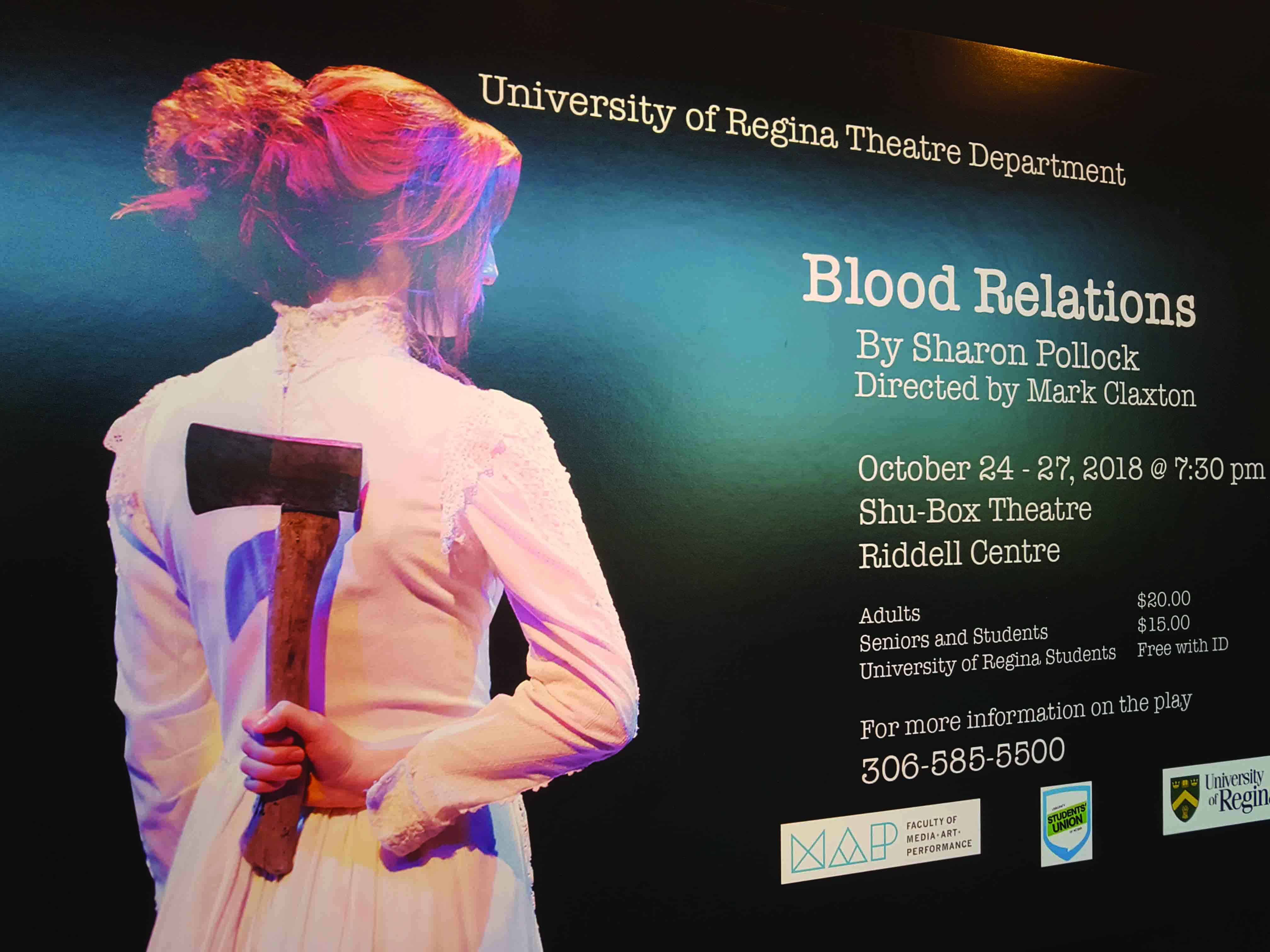Blood Relations onstage this week

author: quinn bell | a&c writer

Sunday Bloody Sunday / Courtesy of the theatre department
Theatre department show Sharon Pollock play
“Lizzie Borden took an axe, and gave her mother forty whacks; When she saw what she had done, she gave her father forty-one!”
Just in time for the Halloween season, the U of R Theatre Department is presenting Blood Relations, Sharon Pollock’s Governor General’s Award-winning play about the infamous Miss Lizzie Borden, accused (and acquitted) of murdering her parents with an axe. After talking with both actress Hannah MacMurchy (who plays Lizzie’s older sister Emma) and director Mark Claxton, it’s been confirmed just how macabre this production will be.
Blood Relations runs Wednesday, Oct 24-27, at 7:30 pm in the Shu-Box Theatre. Tickets are free for students with their student ID..
The story of Lizzie Borden is creepy and haunting. Is Blood Relations going to keep the audience awake at night?
Hannah: I think it absolutely will keep people up at night because it keeps myself and many of the cast members up at night, thinking about all of the tension that is revolved around the Borden household. You could cut the tension in the Borden household with a knife… or an axe rather! The combination of Mark Claxton’s directing and Sharon Pollock’s writing together has made this a mysterious, suspenseful, and yet exciting play to watch unravel in front of you. Not only will this play keep people up at night over fear of what their family members are capable of, but it will likely fuel the fire to find more knowledge about the trial and the Borden family.
It goes deeper than just being spooky, though. What does this production have to tell us about mental health?
Pollock does an amazing job by creating this empathetic character that Rachel Walliser (who plays the actress/Lizzie) portrays, and seeing her fall apart and reaching out to people, and yet no one helps her – it’s really hard to watch. It really brings to light that mental health issues have been very present for a long time and obviously this play takes the outcomes to an extreme – but it doesn’t lessen the value of bringing up the topic of mental health. What makes this play so relatable to present day audiences is that it proposes issues within sexuality, mental health, and the expectations of women in society, which are still very much prominent in our own society. For Lizzie, it isn’t easy being an independent woman who isn’t attracted to men… [she] feels like she needs to fulfill her father’s expectations, though that’s not what her heart wants. There’s a point in the play where she says how people want her to be a mirror of what they want to see and when she’s not that, she’s nothing to them. I think that’s an important message to ensure that we are really “seeing” one another – not just what we want to see in the people we love.
You’re playing Lizzie’s sister, Emma. What kinds of insights into the story does this give you?
Emma is definitely a character who is constantly trying to put out fires in the Borden house. She very much is the mediator of the family, so whenever Lizzie has a problem or her Papa has a problem they always end up going to Emma first, and try to make her fix things. But there comes a point where she can’t take it anymore. Lizzie says she (Emma) always runs away from things, and I feel that’s only because she very much protects herself by not thinking about losing the family farm or not having the freedom that she hoped to have by then. Her avoiding her problems to protect herself, however, eats her up, which makes for a very anxious and worrysome character. She sees everything unravel that Lizzie has done both in the past and present and definitely at the end of the play she’s come to her last straw with Lizzie. It is also true to real life, as she does leave shortly after the events of the end of the play, which occurred in 1902.
Do you have a favourite line?
YES! My favourite line is “Oh Lizzie…Did you?” because I think everyone will be wondering the answer to that question at the point in the play [when] it occurs!
What does it mean to you and the cast to be working on such an important piece of Canadian theatre?
It means so much to me and the cast! I feel so unbelievably blessed to even just be working with such a fantastic group of people and director and production crew – but also to be able to fulfill Sharon Pollock’s vision of Blood Relations, and especially bringing it to Regina is so exciting! I know that almost every University of Regina Theatre student in at least the past 10 years has had to study Blood Relations in our theatre studies classes so it’s exciting to finally be able to bring it to life and to be able to be a part of something that has been talked about for such a long time.
Finally, I have to ask… did she do it?
Oh yes, good question. Well, from Emma’s perspective I think she definitely did it as I know Emma is constantly convincing herself that Lizzie didn’t do it as she was acquitted… But I know there’s a part of her that thinks she did because she did see Lizzie state of being before she left her family! You’ll just have to come see the play and decide for yourself!

This might be a harder question for you as you’re not an actor in the play, but do you have a favourite line?
Mark: Oh, that’s a good question. A favourite line… You know, there’s a line where Lizzie is describing what she’s experiencing in her family life and she talks about how she feels like she’s a mirror and she’s only reflecting what everybody else wants to see. And she feels like, if there’s no one else around, is she even there? She’s wondering if she even exists without other people’s opinions of her. You know Sharon Pollock, the playwright, in fact, identifies that feeling as something that inspired her in a way to write this play… The more I’ve thought about it, the more I’ve thought how often all of us feel that way at some point in our lives: that we spend a lot of our time worrying about what others are seeing in us, or thinking about us, or wanting us to do or be, you know? In this case… it leads to a bit of an extreme outcome, I suppose, but I think it’s a profound thought to have.
Profound is definitely a good word, you know, it shows that the play is about a lot more than just being creepy.
That’s really true. I mean it absolutely is a haunting and dark and creepy story in places, but what really makes this play great is that it is also very much relatable, I think, for any human being who has ever felt a bit unhappy or trapped in the world that they’ve found themselves in.
Is there anything unique about the U of R’s production of the play that you can think of?
One thing: the fact that it’s being done in the Shu-Box, in a smaller space. What it’s inspired us to do is to just go ahead and embrace the opportunity to put the audience kind of right in the thick of the action, in a way. No one in there is going to be very far away from the unfoldings in the house. So, you know, when things start to go bad, people are going to be right close and personal with it (laughter). I think that’s going to give this story some visceral intensity of feeling and intensity of action that people who see it in a bigger proscenium kind of stage might not get to experience. We kind of want people to feel like they’re living in this house, too, and being silent witnesses to what’s happening in the family… I think it will be fun.
Well I was going to ask if you had anything to say to those people who are scared of live theatre and why they should come to Blood Relations. That sounds like one good reason, but…
I think a lot of people have had experiences of excruciating boredom, or went to productions where they weren’t engaged and I feel like that’s always really a shame… It’s really important to me that a work of theatre really tries to include everyone, including those who aren’t acting in it, or even behind the stage, but those who are just in the space, sharing the story… In this space, in that theatre, and with this story, we would really have to work hard, I think, not to get caught up in it, because everyone’s really giving it their all, the script is brilliant and clever and kind of keeps you wondering where it’s going to go… I would say if you’re a person who thinks you don’t like theatre, come and check this out, and it might be an opportunity for you to think differently.
And I guess I just have to ask one more question… do you think Lizzie Borden did it?
(Laughter), Yeah, gosh. I guess would have to go with what many other’s have said: when you look at the circumstantial evidence there certainly appears to be motive for Lizzie to do what she did, or might have done – what she was accused of doing – and opportunity to do it. They never found anyone else that they were able to convict of the crime, and I don’t think anyone was ever arrested or seriously charged for it. So if it wasn’t Lizzie, the question remains who was it? Right? So if you forced me to take a guess I think the likelihood is that she did. I think the much more interesting question is if she did, then why? That’s what this play really explores. Why is a much more interesting question than who at the end of the day, because that’s where the story is. That’s what Sharon Pollock does so brilliantly, is she looks at some possible factors that led to the catastrophe at the end. And that’s one thing I love about this play, too, is that we’re not just looking at a gruesome crime, we’re looking at a family tragedy. However the audience may perceive it, there aren’t really villains in this play. There are just people who are doing their best with what they have. But it all sort of converges in a really tragic event… an appallingly gruesome event.









